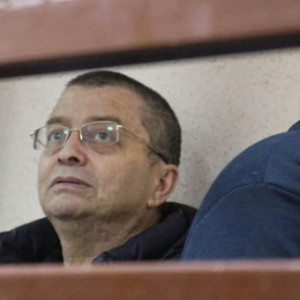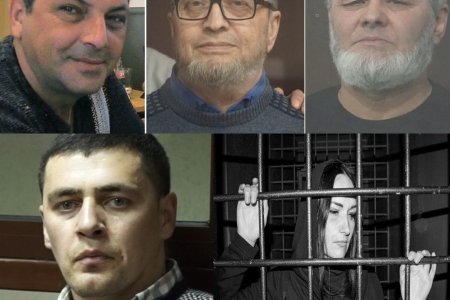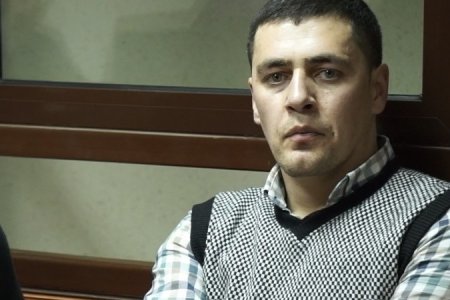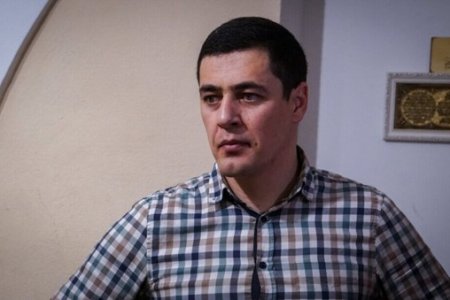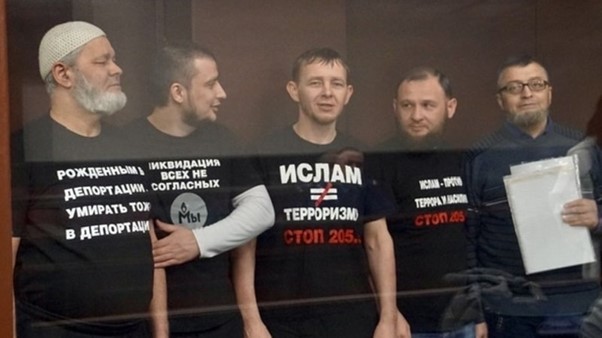
A Russian court of appeal has refused to change huge sentences passed on five recognized Crimean Tatar political prisoners, despite the fact that for two men these were clearly death sentences with one of the men having already been tortured to death. It was probably predictable that the 13-year sentence against the late Dzhemil Gafarov would be upheld since none of the players involved would want to risk acknowledging that he should have never been imprisoned. The ‘judges’ could, however, have intervened to save the life of 63-year-old Servet Gaziev, but did not.
The 11 September ruling by the military court of appeal in Vlasikha (Moscow region) was reported by lawyer Emil Kurbedinov. As he explained to Crimean Solidarity, Dzhemil Gafarov had managed to lodge his appeal shortly before his death in the Russian SIZO [remand prison] in Novocherkassk. Kurbedinov stresses that the appeal court ignored the fact that the original court had passed its sentence in glaring violation of the men’s fundamental rights, as well as of international and even Russian legislation. In two cases, this involved the right to life itself. In late October 2022, Gafarov had suffered a heart attack after the latest gruelling court hearing. Although an ambulance had been called, the doctors did not prescribe any medication and did not insist that he be hospitalized, although there were clearly all grounds for this. In November, Gafarov had informed the court of the heart attack, and asked only that the number of hearings be reduced to, at most, one a week so that his body could recover after the strain of having to walk upstairs, sit for a long time in one position, etc. Presiding judge Valery Opanasenko rejected this modest request although he was well aware of Gafarov’s kidney disease and other life-threatening conditions and even read out the medical document, assigning Gafarov Grade II invalid status. This is issued when 70-80% of a person’s vital organs are not functioning properly. Opanasenko had also rejected all applications for the men to be placed under house arrest, although Gafarov’s conditions included those which, even according to Russian legislation, should have precluded any detention, and Gaziev was also evidently in gravely ill health.
All three ‘judges’ from Russia’s notorious Southern District Military Court: Valery Opanasenko, Andrei Zarya and Stanislav Zhidkov should be held to answer for their role in the five 13-year sentences passed on 11 January 2023 against men who had committed no crime. So too should prosecutors Alexander Bondarev and Igor Nadolinsky who demanded these sentences. Their behaviour in the case of both Gafarov and Gaziev is even more reprehensible as it was clear that both men were effectively being handed a death sentence.
There is every reason to consider that Dzhemil Gafarov was tortured to death. Not only should he have never spent a day in detention, but he was then quite unnecessarily transferred to another SIZO when he was already suffering acute chest pain, breathlessness and other clear signs that his life was in immediate danger. He died on 10 February 2023.
Servet Gaziev (b. 1960) informed Kurbedinov that over a year has passed since he suffered a stroke, yet the doctors who carried out the only medical examination in over four years have refused to disclose their diagnosis, and he has received no medical care. As before, the prison staff simply inject him with painkillers, a practice which Svitlana Ablyamitova, who is a doctor, has long warned is further endangering her brother who has consistently suffered excruciating stomach pain. One side of Gaziev’s body is working badly since the stroke, yet that too being ignored.
In their final addresses to the court of appeal, the other three Crimean Tatar political prisoners - Alim Karimov; Seiran Murtaza and Erfan Osmanov drew attention to the horrific treatment that Dzhemil Gafarov had received, with Erfan Osmanov also pointing out that the torture and violence against Servet Gaziev had continued since his stroke.
Although cassation appeals are planned, the ruling on 11 September means that this same ‘court of appeal in Vlasikha’ has upheld 25 horrific sentences in Russia’s worst attack to date against the important Crimean Solidarity human rights initiative and Crimean Tatar journalists and activists in general. This mass attack aroused international condemnation and demands for the men’s release, from, among others, the US State Department, Human Rights Watch, Freedom House and the European Parliament. Human Rights Watch, for example, called the arrests “an unprecedented move to intensify pressure on a group largely critical of Russia’s occupation of the Crimean Peninsula” and said that attempts “to portray politically active Crimean Tatars as terrorists” were aimed at silencing them. The Memorial Human Rights Centre was swift to declare all the men political prisoners, stating that Russia was using fabricated charges carrying huge sentences to try to crush Crimean Solidarity and the Crimean Tatar human rights movement.
Russia’s response was to try to deflect attention from such an evident offensive against civic activists and journalists by dividing one trial into five essentially identical ‘clones’. All of the men have now been sentenced, without any crime, to terms of imprisonment from 13 to 19 years in the worst of Russian penal institutions.
The ‘trial’, sentences and tragically predictable rejection of the appeals in the case of the above five men took so long only because of the number of times hearings needed to be postponed because Gafarov and Gaziev were so unwell. Other than that, there were absolutely no differences. All 25 civic journalists and activists were charged only with ‘involvement’ in the Hizb ut-Tahrir movement, a peaceful transnational Muslim organization which is legal in Ukraine and which is not known to have carried out acts of terrorism anywhere in the world. Russia has never provided any grounds for its highly secretive 2003 Supreme Court ruling that declared Hizb ut-Tahrir ‘terrorist’, yet this inexplicable ruling is now being used as justification for huge sentences on supposed ‘terrorism charges’. Some of the men faced the more serious charge of ‘organizing’ a Hizb ut-Tahrir group (Article 205.5 § 1 of Russia’s criminal code). Others, including the above-named, were accused under Article 205.5 § 2 of ‘involvement’. They were also charged, by the country that invaded and annexed Ukrainian Crimea, with c “planning a violent seizure of power and change in Russia’s constitutional order” (Article 278).
Nor, it should be stressed, was any actual proof ever provided to back the flawed charges regarding Hizb ut-Tahrir. All 25 ‘convictions’ and huge sentences were based solely on illicitly taped conversations three years before the men’s arrests in which they discussed ‘courage’, religion and Russian political and religious persecution. These were then transcribed and translated with almost certainly deliberate mistakes and sent to FSB-loyal ‘experts’ willing to ‘find’ whatever they know is demanded. It was such ‘expert assessments that were used, together with ‘testimony’ of anonymous ‘witnesses’ who may have never met the men which were used to pass massive sentences. These are far greater than those passed on actual criminals, such as the multiple killers and violent gang leaders who have been released and pardoned by Russian president Vladimir Putin serving as killers in Russia’s war of aggression against Ukraine.
